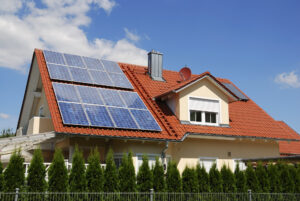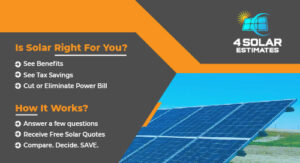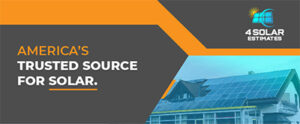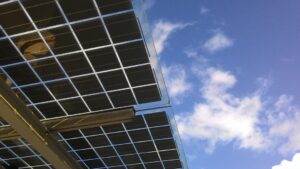
4 Main Types of Solar Panels
When deciding to get solar panels installed, it’s important to consider the types of solar panels available. There are four main types of solar panels: monocrystalline, polycrystalline, thin film, and concentrating. Each type has its own unique benefits and drawbacks, which we’ll explore in this article below.
COMPARE SOLAR QUOTESWhat to Know About the 4 Types of Solar Panels
Each type of solar panel you can choose from has its own unique benefits and drawbacks.
- Monocrystalline solar panels are made from a single crystal of silicon, which makes them the most efficient and expensive type of solar panel.
- Polycrystalline solar panels are made from multiple crystals of silicon, which makes them less efficient but cheaper than monocrystalline solar panels.
- Thin film solar panels are made from a thin layer of semiconductor materials, which makes them the least efficient but also the cheapest type of solar panel.
- Concentrating solar panels use mirrors to focus the sun’s rays on a small area, which makes them more efficient but also more expensive than other types of solar panels.
Monocrystalline Solar Panels
- These panels are usually about 15-20% efficient, but they can be more than 25% efficient in optimal conditions. They also have a long lifespan of around 25 years.
- The biggest downside to monocrystalline solar panels is their high cost. However, since they are so efficient and have such a long lifespan, they can be a good investment in the long run.
- If you’re looking for the best performance possible from your solar panels, monocrystalline is the way to go.
- With such a high-efficiency rating monocrystalline solar panels generally cost between 25-30% more than other solar panel types falling around the $3.50/watt range.

Polycrystalline Solar Panels
- Polycrystalline solar panels are a good choice for those who are looking for a more affordable option, and they still have a lifespan of around 20 years.
- Since polycrystalline solar panels are not as efficient as monocrystalline solar panels, you will need to install more of them to get the same amount of power. However, this can be offset by their lower cost.
- These panels are usually about 12-17% efficient, and they tend to have a shorter lifespan of around 15 years.
- The average cost of polycrystalline solar panels is around $2.50 per watt, which is about half the price of monocrystalline solar panels.
Thin Film Solar Panels
- Thin film solar panels are the least efficient type of solar panel, with an efficiency rating of around 8-12%, but they are also the cheapest type available.
- While thin film solar panels may not be as efficient as other types of solar panels, they are still a good option for those who are on a tight budget.
- Thin film solar panels generally cost between $1.00 and $2.00 per watt, making them one of the most affordable options on the market.
- They also have an average lifespan of around 10 years.
Concentrating Solar Panels
- Concentrating solar panels use mirrors to focus the sun’s rays on a small area, which makes them more efficient but also more expensive than other types of solar panels.
- If you’re looking for a panel that can get the most out of the sun’s energy, concentrating solar panels are the way to go.
- On average you can expect to pay around $3.00-$5.00 per watt for concentrating solar panels, which is significantly higher than the other types of panels available. However, these panels are usually more efficient than other types, with efficiency ratings of around 20-40%.
- They also have an average lifespan of 25 years or more.

How to Know Which Type of Solar Panels is Right for You
When it comes to choosing solar panels, there are a few things to consider. The most important thing to think about is what type of solar panel is right for you.
COMPARE SOLAR QUOTES- If you’re looking for the most efficient and expensive option, monocrystalline solar panels are the way to go. They are made from a single crystal of silicon, which makes them the most efficient type of solar panel available. However, they also have the highest cost.
- If you’re looking for a more affordable option, polycrystalline solar panels may be a better choice. They are made from multiple crystals of silicon, which makes them less efficient but also less expensive than monocrystalline solar panels.
- Thin film solar panels are the least efficient type of solar panel available, but they are also the cheapest. If you’re on a tight budget, they may be the best option for you.
- Concentrating solar panels are more expensive than other types of solar panels, but they are also more efficient. If you’re looking for a panel that can get the most out of the sun’s energy, concentrating solar panels may be right for you.
Ultimately, the type of solar panel you choose will depend on your budget, energy needs, and preferences. By considering the pros and cons of each type of solar panel, you can make an informed decision about which one is best for your home.

How to Choose a Solar Panel Installer
When it comes to installing solar panels, it’s important to choose a reputable and qualified installer. Here are a few tips for choosing the right installer for your home:
1. Ask for referrals from family and friends. Chances are, someone you know has already installed solar panels and can recommend an installer.
2. Do your research online. There are plenty of reputable solar panel installers with good reviews online.
3. Get quotes from several installers. It’s important to compare quotes from different installers to make sure you’re getting the best deal.
4. Check licensing and insurance. Make sure the installer you choose is licensed and insured.
5. Read reviews. Once you’ve narrowed down your choices, be sure to read reviews from past customers to get a sense of the quality of their work.
By following these tips, you can choose a solar panel installer that is right for your home and your needs.
COMPARE SOLAR QUOTES
Leave a Reply